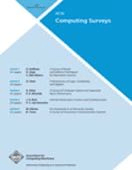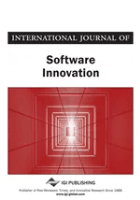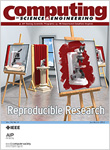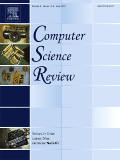
ACM COMPUTING SURVEYS
Scope & Guideline
Elevating Understanding in Computer Science
Introduction
Aims and Scopes
- Comprehensive Surveys:
The journal publishes extensive surveys that synthesize and analyze significant research areas, offering insights into the methodologies, challenges, and future research directions. - Interdisciplinary Research:
ACM CSUR encourages submissions that span across various disciplines within computing, integrating insights from areas such as artificial intelligence, cybersecurity, software engineering, and data science. - Emerging Technologies:
The journal focuses on emerging technologies and trends, providing critical evaluations and discussions on their potential impacts and applications. - Methodological Rigor:
Papers published in ACM CSUR are expected to demonstrate methodological rigor, ensuring that the surveys are not only informative but also grounded in established research practices. - Community Engagement:
The journal aims to facilitate discourse within the research community by highlighting ongoing debates, proposing future research trajectories, and addressing gaps in existing literature.
Trending and Emerging
- Artificial Intelligence and Machine Learning:
There is a significant increase in surveys regarding AI and machine learning applications across various domains, highlighting their transformative impact on industries and research. - Cybersecurity and Privacy:
The growing concern over data breaches and cyber threats has led to a surge in publications focusing on cybersecurity measures, privacy-preserving technologies, and resilience against attacks. - Edge Computing and IoT:
Research on edge computing and the Internet of Things (IoT) is gaining momentum, driven by advancements in distributed computing and the need for real-time processing. - Blockchain and Decentralization:
Emerging trends in blockchain technology, particularly in its applications beyond cryptocurrency, are increasingly covered, reflecting its potential in various sectors. - Explainable AI and Fairness:
With the rise of AI applications, there is an expanding focus on explainability, interpretability, and fairness in machine learning algorithms to ensure ethical and transparent practices.
Declining or Waning
- Traditional Software Engineering Practices:
There has been a noticeable decrease in surveys focusing on conventional software engineering practices, possibly due to the shift towards more agile and DevOps methodologies. - Legacy Systems and Technologies:
Research related to legacy systems is becoming less prominent as newer technologies and systems architecture gain traction in both academic and industrial contexts. - Static Analysis Tools:
Surveys on static analysis tools have seen a decline, which may indicate a shift towards more dynamic, real-time analysis methods in software development. - Hardware-Centric Research:
There is a waning interest in traditional hardware-centric research topics as the focus shifts increasingly towards software-defined solutions and cloud-based architectures.
Similar Journals

JOURNAL OF COMPUTER SCIENCE AND TECHNOLOGY
Unveiling New Horizons in Computer ScienceJOURNAL OF COMPUTER SCIENCE AND TECHNOLOGY, published by Springer Singapore Pte Ltd, is a pivotal platform in the rapidly evolving realms of computer science and technology. With an ISSN of 1000-9000 and an E-ISSN of 1860-4749, this journal encompasses a diverse array of topics including computational theory, hardware and architecture, software engineering, and applications of computer science. Spanning over three decades from 1986 to 2024, it boasts an impressive standing within academic circles, ranking in the Q2 quartile across several key categories and achieving notable placement in Scopus metrics. Although this journal operates under a subscription-based model, it remains a crucial resource for researchers, professionals, and students seeking to advance their knowledge and contribute to discussions in computer science. The JOURNAL OF COMPUTER SCIENCE AND TECHNOLOGY is committed to fostering innovation and scholarly communication in the field, encouraging submissions that contribute substantive advancements in theory and application.

International Journal of Software Innovation
Driving Change Through Software Research and Collaboration.The International Journal of Software Innovation, published by IGI Global, serves as a crucial platform for disseminating cutting-edge research in the field of software engineering and innovation. With its ISSN 2166-7160 and E-ISSN 2166-7179, this journal has a broad scope that encompasses multiple areas of computer science, including Artificial Intelligence, Computer Graphics and Computer-Aided Design, Computer Networks and Communications, Software, and Computer Science Applications. Since its inception in 2017 and continuing until 2024, the journal has established itself in Q4 quartiles across various categories, reflecting both emerging trends and foundational principles in software innovation. Although it does not currently follow an Open Access model, its findings are vital for researchers, professionals, and students aiming to understand and contribute to the evolving landscape of software technologies. Located in the United States at 701 E Chocolate Ave, Ste 200, Hershey, PA 17033-1240, this journal not only offers research insight but also encourages collaboration and knowledge sharing among scholars worldwide.

Computer Science Journal of Moldova
Fostering Collaboration for a Brighter Digital FutureComputer Science Journal of Moldova, published by the Institute of Mathematics and Computer Science Academy, serves as a pivotal platform for disseminating research in the field of computer science since its inception in 1993. With a focus on a diverse range of subjects, including Artificial Intelligence, Computational Mathematics, and Software Engineering, this open access journal aims to foster innovation and collaboration among researchers, students, and industry professionals. Despite its current positioning in the lower quartiles as per the latest Scopus rankings, the journal remains committed to enhancing the visibility of regional research and addressing contemporary challenges through scholarly contributions. The journal’s open access model ensures that knowledge is freely available, promoting broader readership and impact within the international academic community. As it moves through the converged years from 2019 to 2024, the Computer Science Journal of Moldova continues to aspire toward empowering the next generation of computer scientists while enriching the global dialogue in this rapidly evolving field.

INFORMATION SYSTEMS FRONTIERS
Advancing the Boundaries of Information Systems ResearchINFORMATION SYSTEMS FRONTIERS, published by Springer, stands at the forefront of interdisciplinary research in the fields of Computer Networks, Information Systems, Software Engineering, and Theoretical Computer Science. Since its inception in 1999, the journal has established itself as a highly regarded source of innovative research, reflected in its impressive Q1 status across multiple categories as of 2023, indicating a prominent position in the academic landscape. With a dedicated focus on disseminating cutting-edge findings and fostering a better understanding of complex information systems, this journal serves as an essential platform for researchers, professionals, and students alike. Authors benefit from a rigorous peer-review process, while readers gain access to pivotal advancements that drive the evolution of technology and information processing. Located in the Netherlands, the journal is poised to continue shaping the discourse in information systems until its converged years of 2024 and beyond.

COMPUTING IN SCIENCE & ENGINEERING
Driving Progress in Computing for Scientific Discovery.COMPUTING IN SCIENCE & ENGINEERING, published by the IEEE Computer Society, is a leading journal dedicated to bridging the gap between computing principles and practical applications in the realms of science and engineering. With an impact factor that reflects its strong reputation, this journal is essential for researchers, professionals, and students seeking to explore the latest developments as well as interdisciplinary collaborations in computing. Since its inception in 1999, the journal has undergone many transformations to remain at the forefront of innovation, with a converged publication range extending through 2024. It is categorized in the Q2 quartiles for both Computer Science and Engineering, demonstrating its significance in these fields, as evidenced by its Scopus rankings, placing it in the top 30% of general engineering and computer science journals. As part of the open-access movement, readers are encouraged to engage with cutting-edge research, fostering a deeper understanding and application of computing in various scientific disciplines. Discover the latest findings and contribute to advancing knowledge in this dynamic and critical area of study.

Frontiers of Computer Science
Navigating the Evolving Landscape of Computer Science ResearchFrontiers of Computer Science is a leading peer-reviewed journal dedicated to advancing the field of computer science through the publication of high-quality research articles, reviews, and theoretical discussions. Published by HIGHER EDUCATION PRESS, this journal has gained significant recognition, currently boasting a prestigious impact factor and ranking in the Q1 quartile for both Computer Science (miscellaneous) and Theoretical Computer Science categories in 2023. With a focus on the intersection of computational theory and practical applications, it serves as a vital platform for researchers, professionals, and students alike who are eager to contribute to and stay updated with groundbreaking developments. The journal’s scope encompasses a wide range of topics, reflecting the diverse nature of computer science today. Operating from Beijing, China, it emphasizes Open Access, ensuring that vital research is readily available to the global academic community. With its convergence period spanning from 2013 to 2024, Frontiers of Computer Science remains committed to fostering innovation and scholarly dialogue that drives the future of technology.

Infocommunications Journal
Bridging Research and Practice in InfocommunicationsInfocommunications Journal, published by the SCIENTIFIC ASSOCIATION INFOCOMMUNICATIONS, stands as a vital resource within the fields of Computer Science and Electrical and Electronic Engineering. Since its inception in 2011, this journal has consistently contributed to the discourse surrounding innovations and research trends in these dynamic disciplines, culminating in a converged operational span through 2024. With an ISSN of 2061-2079 and an E-ISSN of 2061-2125, it is indexed in Scopus, showcasing impressive rankings within its categories, notably a Q3 classification in both Computer Science (miscellaneous) and Electrical and Electronic Engineering as of 2023. Although the journal operates under a non-open access model, its contributions are nonetheless essential for researchers and professionals seeking to advance their knowledge and practice. Situated in Budapest, Hungary, at Kossuth Lajos Square 6-8, 1055, the Infocommunications Journal is committed to fostering a rich scholarly exchange, making it an indispensable platform for those invested in the frontiers of technology and communication.

Computer Science Review
Unlocking Theoretical Breakthroughs in ComputingComputer Science Review, published by ELSEVIER, is a premier academic journal dedicated to advancing the field of computer science. With an impactful 2023 Scopus ranking placing it in the top quartile (Q1) of both Computer Science (miscellaneous) and Theoretical Computer Science, it stands as a vital resource for cutting-edge research and theoretical advancements. This journal, identified by the ISSN 1574-0137 and E-ISSN 1876-7745, covers a broad spectrum of topics in computer science, ensuring that it remains relevant to contemporaneous academic discourse. The journal has been continuously published since 2007 and commits to fostering an engaged scholarly community through comprehensive reviews and theoretical insights. With access primarily through subscriptions, it aims to reach both researchers and practitioners eager to explore innovative ideas and contribute to this fast-evolving discipline.

Computer Science and Information Systems
Pioneering Research for a Digital TomorrowComputer Science and Information Systems, an esteemed journal published by the COMSIS CONSORTIUM, serves as a vital platform for researchers and practitioners within the field of computer science and information systems. With an ISSN of 1820-0214, this open access journal has been disseminating high-quality research since 2004, making scholarly content readily accessible to a global audience. Based in Novi Sad, Serbia, the journal has established itself as a point of reference in the academic community, achieving a Q3 ranking in the Computer Science (miscellaneous) category as of 2023. With its coverage spanning from 2008 to 2024, it caters to a diverse range of topics, including software engineering, data processing, and system architecture. Although the HIndex is currently not available, the journal holds a respectable 43rd percentile ranking in the Scopus database for general computer science, showcasing its relevance in the field. By offering an open access model, it ensures that groundbreaking research can be freely accessed and utilized, fostering innovation and collaboration across disciplines.

JOURNAL OF SUPERCOMPUTING
Connecting Scholars in the Supercomputing CommunityJOURNAL OF SUPERCOMPUTING is a premier academic journal published by SPRINGER, situated in the Netherlands, that has made significant contributions to the fields of computer science, particularly in hardware and architecture, information systems, software, and theoretical computer science. With a robust publication history spanning from 1987 to 2024, this journal has cultivated a strong reputation, evidenced by its Category Quartiles ranking in the Q2 category across multiple relevant domains in 2023. The journal's Scopus rankings further underscore its influence, boasting a 78th percentile in mathematics and theoretical computer science, revealing the high quality of research disseminated within its pages. As vital discourse unfolds in the realm of supercomputing—where innovative techniques and technologies rapidly evolve—this journal serves as a crucial platform for researchers, professionals, and students to explore cutting-edge studies and build upon the foundations of knowledge in this dynamic field.